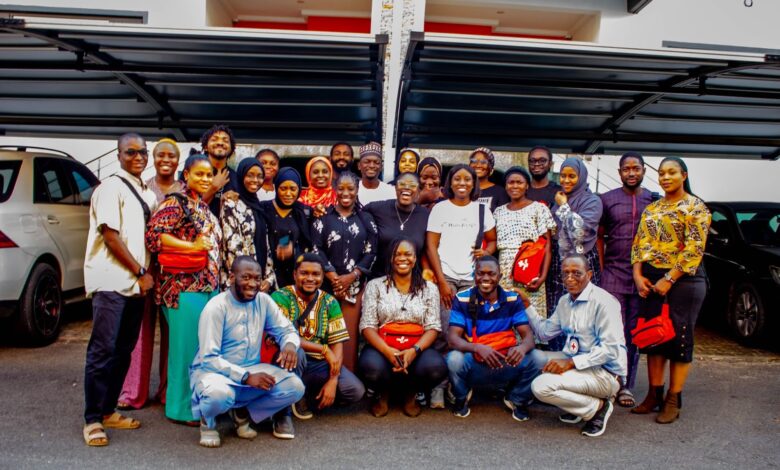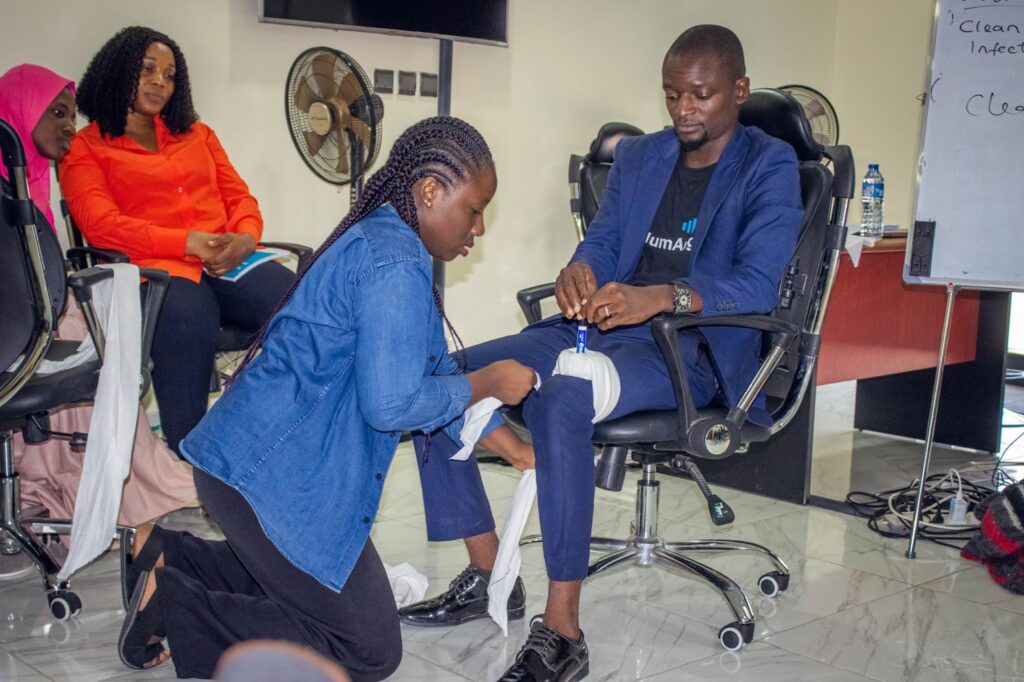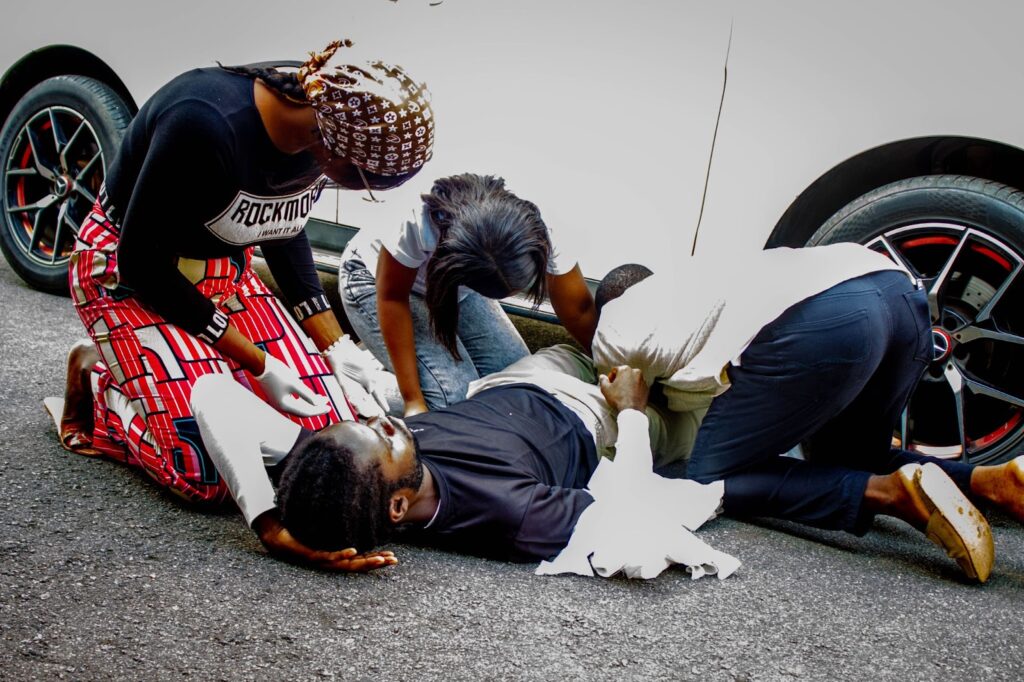ICRC Conducts 2-Day First Aid Training For HumAngle Journalists
The training by the ICRC, held at HumAngle’s head office in Abuja, was aimed at equipping our staff with vital emergency response skills that can be useful on the field, in the workplace, and at home.

The International Committee of the Red Cross (ICRC), has just concluded an intensive 2-day first aid training for HumAngle journalists. Held at the HumAngle Headquarters in Abuja, Nigeria, on Tuesday, Aug. 20th and Wednesday, Aug. 21st, the training brought together about 25 participants from HumAngle.
With HumAngle’s focus on conflict reporting, the sessions were designed to prepare the team to manage emergency situations they may encounter while on the field, particularly in conflict zones, at the workplace or home.
The training was conducted by experienced members of the ICRC, including Aliyu Dawobe, a Public Relations Specialist; Eleojo Esther Akpa, a communications officer-analyst; and Hajara Mustapha, a First Aid and Pre-Hospital Field Officer. Their expertise was instrumental in delivering a thorough and interactive program designed to address the specific needs of journalists and other staff who often find themselves in precarious situations while covering conflicts and humanitarian crises.
The first day of training commenced with an insightful presentation by Eleojo Esther Akpa, who provided participants with a background on the history, activities, and mission of the International Committee of the Red Cross (ICRC), explaining vital things like how the ICRC emblem came to be, the founder’s motivation, and the scope of the organisation. This session set the stage for practical lessons on first aid practices, which was led by Hajara Mustapha.
Mustapha guided participants through essential first aid concepts, beginning with an introduction to first aid and safety and security protocols. The training covered the DRABC approach—Danger, Response, Airway, Breathing, and Circulation—emphasising its importance in assessing and responding to emergencies. Participants also learned how to place individuals in a recovery position, manage cases of difficult breathing and unconsciousness, treat shock, conduct full-body examinations, and handle bleeding and wounds, including those caused by gunshots.

The second day of the training focused on more advanced aspects of emergency care. Mustapha led sessions on treating burns, scalds, bites, and fractures, as well as more complex scenarios such as managing casualties of Sexual and Gender-Based Violence (SGBV) and high-consequence infectious diseases (HCiD). Participants also learned techniques for safely removing and transporting casualties.
The day’s activities were highly interactive, with participants engaging in practical exercises that simulated real-life emergency scenarios. Some acted as casualties, while others took on the role of first aiders, applying the skills they had learned to provide care. These simulations were followed by evaluations, allowing participants to receive feedback on their performance.
The training concluded with the distribution of first aid kits to all participants, ensuring they were equipped with the necessary tools to apply their newfound skills in real-world situations.

The training was met with enthusiasm and appreciation from HumAngle’s staff, who recognised the importance of the skills they had acquired. With HumAngle’s focus on reporting from conflict-affected regions, the first aid training was deemed vital for ensuring the safety of its journalists and staff. According to the Managing Editor, Hauwa Shaffii Nuhu, the training was not only about self-preservation but also about equipping staff to assist others who might be in danger, whether in the course of their work or in everyday situations.
“It has been highly interactive and impactful training,” Nuhu remarked. “And because we are conflict reporters, we sometimes find ourselves in precarious situations. Harm might not always come to us, but it might come to people who live in the kinds of areas where we do our reportage. And so training like this is really important to equip us to not only care for ourselves and our colleagues but also to care for people who we might encounter in our everyday lives, who need these kinds of interventions.”
Nuhu expressed her commitment to reinforcing the skills within her team by regularly quizzing them on how they would handle different emergency scenarios. She emphasised the need for ongoing training to ensure that the team remains prepared to handle any situation that might arise.
Angela Umoru-David, Director of HumAngle Foundation, echoed these sentiments, stressing the value of the training for the safety of both the team and the stakeholders they interact with in the field. She advocated for regular refresher courses to prevent the practical skills learned from being forgotten over time.
Jurbe Simon, a clinical psychologist at HumAngle, also expressed his determination to ensure that the knowledge gained from the training would be put to good use. He plans to integrate the skills into the team’s approach to crisis management and emergency response, further reinforcing the organisation’s commitment to safety.
HumAngle’s Chief Executive Officer, Ahmad Salkida, expressed gratitude to the ICRC trainers for their exceptional delivery of the program. He highlighted the alignment between HumAngle’s mission and the ICRC’s work, both of which focus on supporting victims of conflict and humanitarian crises. Salkida commended his team while emphasising the importance of applying the lessons learned not only within the organisation but also in the broader communities they serve.
The ICRC team assured HumAngle of continued collaboration, particularly on international days dedicated to raising awareness of humanitarian issues.
Support Our Journalism
There are millions of ordinary people affected by conflict in Africa whose stories are missing in the mainstream media. HumAngle is determined to tell those challenging and under-reported stories, hoping that the people impacted by these conflicts will find the safety and security they deserve.
To ensure that we continue to provide public service coverage, we have a small favour to ask you. We want you to be part of our journalistic endeavour by contributing a token to us.
Your donation will further promote a robust, free, and independent media.
Donate HereStay Closer To The Stories That Matter




